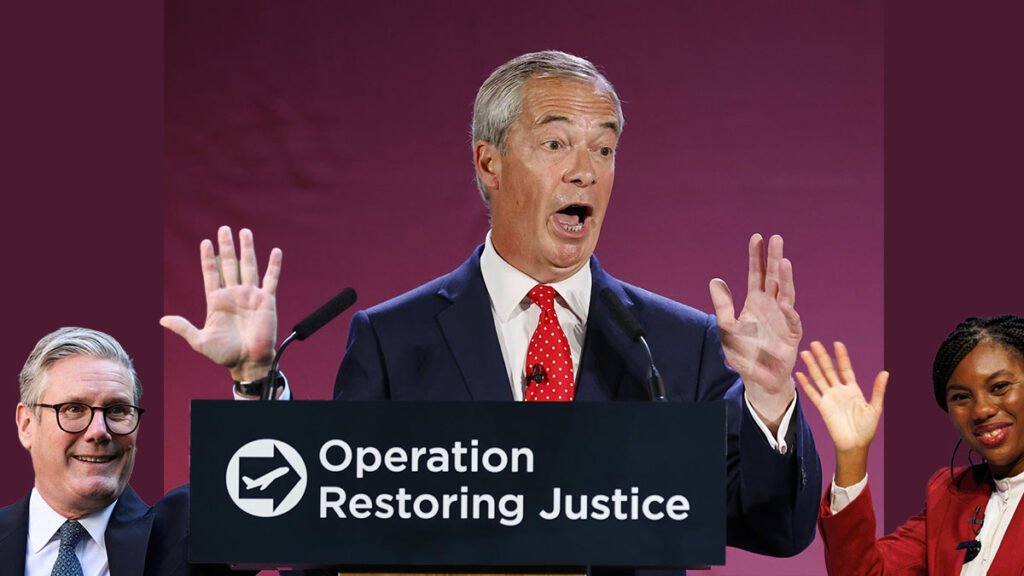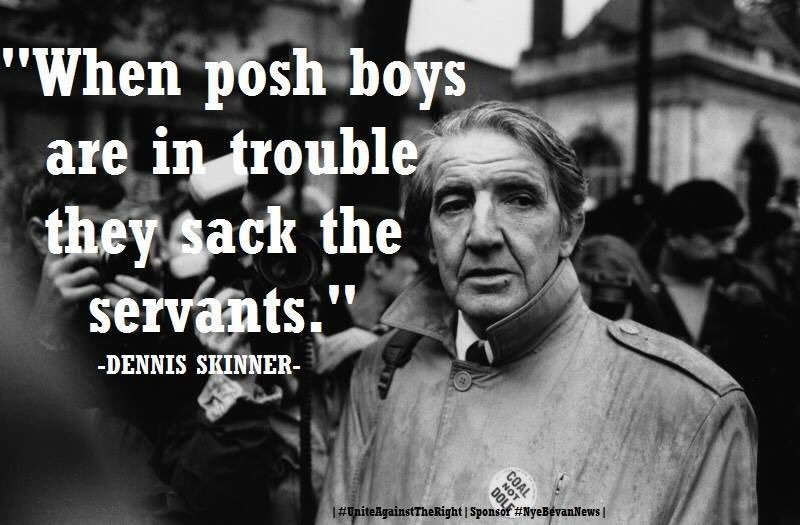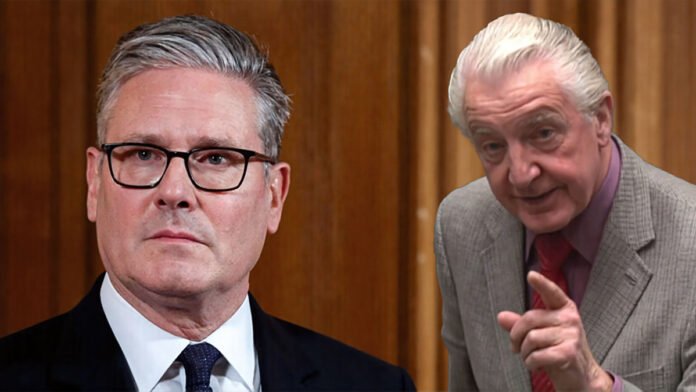Every Toolmaker knows, A Bad Worker Blames his Tools
Dennis Skinner had it right: “When posh boys are in trouble, they sack their servants.” The Beast of Bolsover’s acid observation rings truer than ever as Keir Starmer frantically reshuffles his No 10 operation like a desperate middle manager blaming everyone but himself for systemic failure. Starmer displays remarkable difficulty building and maintaining his teams, a pattern that reveals more about his leadership than any amount of spin can disguise.
The latest round of musical chairs sees Darren Jones moved from Treasury Chief Secretary to the newly invented role of “Chief Secretary to the Prime Minister”, a title that sounds important while masking the reality that Starmer cannot manage his own priorities without creating new bureaucratic layers. When your solution to delivery problems is adding more managers to manage the managers, you’ve already admitted defeat.
The Turnover Tells the Tale

The scale of upheaval after just over one year of taking power suggests not strategic governance but management panic. Nin Pandit, Starmer’s top civil service aide, lasted less than ten months before her “departure” (though No 10 insists she didn’t quit, the distinction matters little when key staff keep vanishing). James Lyons, the director of communications for strategy, is stepping down after barely a year in post. Liz Lloyd from the policy unit is “leaving but expected to move to a new role”, Whitehall speak for being shuffled sideways out of the way. Remember the Sue Gray fiasco.
This isn’t normal governmental evolution; it’s institutional chaos disguised as reform. When your communications operation requires constant shake-ups, when policy units experience “internal conflict over who was running the department,” when you need to import Tony Blair veterans like Tim Allan and Minouche Shafik to provide ‘adult supervision’, you’re not leading, you’re surviving.

The Blair Template Strikes Again
The pattern becomes clearer when you realise that Starmer’s longest-serving aide, Stuart Ingham, is being moved out of policy work into Morgan McSweeney‘s more “political role.” This represents the triumph of political management over policy development, the prioritisation of spin over substance that defines New Labour’s approach to governance.
The personnel choices reveal everything about Starmer’s intellectual bankruptcy. Tim Allan, a Blair adviser turned corporate PR executive, returns to run government communications, while Minouche Shafik becomes chief economic adviser despite her role overseeing the Bank of England policies that helped create today’s economic crisis. When your solution to contemporary problems involves recycling the people who created them, you’ve run out of ideas.
The appointment of David Dinsmore, former editor of Murdoch’s Sun, as permanent secretary for communications sends an even clearer signal. This government’s idea of fixing its messaging problems involves hiring the man who spent years attacking the very communities Labour claims to represent. Nothing says “reconnecting with working-class voters” like putting a Murdoch lieutenant in charge of your communications strategy.
These aren’t technocratic appointments based on competence; they represent ideological alignment with the very establishment forces that Labour once opposed. When your personnel choices could have been made by David Cameron or Tony Blair, you’ve abandoned any pretence of representing alternative politics.
The Reform Problem Exposes Labour’s Weakness

The admission that Nigel Farage “dominated the political agenda” throughout the summer reveals the strategic poverty underlying these reshuffles. Rather than developing compelling alternative narratives, Starmer’s team spent months reacting to Reform UK’s provocations while falling behind them in the polls, a humiliation that would have been unthinkable for any previous Labour leader.
The response? More communications advisers, more strategic directors, more layers of management to handle the “messaging problem”. This fundamentally misunderstands the crisis facing Labour. The issue isn’t insufficient spin but insufficient substance. When your policies serve establishment interests while your rhetoric claims to represent working people, no amount of communications expertise can resolve that contradiction.
The creation of Darren Jones’s new role as delivery tsar represents similar confusion. The government’s delivery problems stem not from organisational charts but from policies designed to serve corporate interests rather than popular needs. You cannot deliver transformative change through technocratic management when your policies amount to managed decline with better public relations.
The Command and Control Delusion

Downing Street sources describe these changes as creating a “command and control” operation, language that reveals the authoritarian instincts lurking beneath Labour’s democratic rhetoric. The idea that governmental effectiveness emerges from tighter central control reflects the same technocratic arrogance that has defined establishment politics for decades.
Real delivery requires policies that serve popular interests, adequate resources for implementation, and political courage to confront vested interests that benefit from current arrangements. None of Starmer’s reshuffles address these fundamental requirements because doing so would require admitting that the government’s problems stem from its political choices rather than organisational structures.
The appointment of a “growth mission champion” exemplifies this delusional thinking. Britain’s growth problems result from decades of financialization, deindustrialisation, and wealth extraction that Labour shows no intention of reversing. Creating ministerial positions to champion growth while maintaining the policies that prevent it represents the kind of magical thinking that pervades contemporary establishment politics.
The Servant Problem

Dennis Skinner’s observation about sacking servants applies perfectly to Starmer’s approach. Rather than examining whether his policies serve working-class interests, whether his political strategy addresses contemporary crises, whether his leadership provides genuine alternatives to Conservative failure, he blames staff for implementation problems and communications difficulties.
This reflects the managerial mindset that treats politics as administration rather than democratic representation. When your political project reduces to better management of the same failing systems, personnel changes become substitutes for policy changes, organizational reforms replace political reforms, and tactical adjustments mask strategic poverty.
The irony is acute for someone who trades on his father’s occupation. Toolmakers solve problems through practical application, learning from failure, and adapting methods to achieve results. Starmer’s approach resembles corporate consultancy: when initiatives fail, reorganise the teams, import expensive advisers, create new management layers, and hope that structural changes compensate for strategic confusion.
The Autumn of Discontent Ahead

The timing of these changes reflects awareness that worse lies ahead. The return of Parliament brings challenges that no amount of reshuffling can address: tax rises that will anger middle-class supporters, asylum hotel battles that expose policy bankruptcy, economic problems that technocratic solutions cannot resolve.
The government’s response involves importing more Blair veterans, creating more management positions, and hoping that better communications can disguise policy failure. This represents the kind of thinking that produced New Labour’s ultimate collapse. The belief that political problems have technical solutions, that spin can substitute for substance, that professional management can replace democratic leadership.
The Pattern of Failure

Starmer’s personnel chaos reveals deeper truths about contemporary Labour. This is a party led by people who understand corporate management but not political leadership, who know how to serve establishment interests but not popular needs, who can organise bureaucracies but not movements.
The constant reshuffles, the revolving door of advisers, the reliance on Blair-era figures all point to the same conclusion: this government lacks the political vision necessary for transformative change and the practical competence necessary for effective management. It falls between two stools, satisfying neither radical supporters who expected change nor moderate voters who wanted competence.
For a toolmaker’s son, Starmer shows remarkable difficulty with the basic requirements of his job: building effective teams, maintaining institutional stability, and delivering results that justify public trust. His father would probably recognise the type: the manager who blames tools rather than examining technique, who changes personnel rather than methods, who reorganises rather than performs.
The reshuffle represents not strength but weakness, not strategic thinking but reactive panic, not confident leadership but desperate improvisation. When your solution to political problems involves hiring more advisers to advise your advisers, you’ve already lost the argument. The servants may be sacked, but the master remains the problem.
Support Independent Journalism Today
Our unwavering dedication is to provide you with unbiased news, diverse perspectives, and insightful opinions. We're on a mission to ensure that those in positions of power are held accountable for their actions, but we can't do it alone. Labour Heartlands is primarily funded by me, Paul Knaggs, and by the generous contributions of readers like you. Your donations keep us going and help us uphold the principles of independent journalism. Join us in our quest for truth, transparency, and accountability – donate today and be a part of our mission!
Like everyone else, we're facing challenges, and we need your help to stay online and continue providing crucial journalism. Every contribution, no matter how small, goes a long way in helping us thrive. By becoming one of our donors, you become a vital part of our mission to uncover the truth and uphold the values of democracy.
While we maintain our independence from political affiliations, we stand united against corruption, injustice, and the erosion of free speech, truth, and democracy. We believe in the power of accurate information in a democracy, and we consider facts non-negotiable.
Your support, no matter the amount, can make a significant impact. Together, we can make a difference and continue our journey toward a more informed and just society.
Thank you for supporting Labour Heartlands









